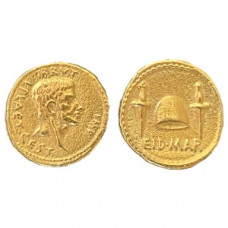Reproduction Aureus of Brutus – Ides of March
Obverse: Bare Head of Brutus right, wearing slight beard. Text around: BRVT IMP L PLAET CEST (Brutus, Imperator, Lucius Plaetorius Cestianus).
Reverse: Pileus (cap of liberty), a symbol of patriotism associated with Castor and Pollux, the mythical patrons of the Roman Army, between two daggers of different designs, representing the weapons used by Brutus and Cassius in the assassination of Caesar. Text in exergue: EID MAR an abbreviation of ‘EIDIBVS MARTIIS’ (the Ides of March).
History: Only 3 examples of the Aureus 'Ides of March' coin are known to exist and is arguably the most famous Roman coin type in existence. Brutus' EID MAR issue relates to one of world history's crucial turning points, the assassination of Julius Caesar on the Ides of March. On 15 March 44 BC, a group of senators led by Marcus Junius Brutus and Gaius Cassius Longinus attacked the dictator during a senate meeting and stabbed him to death. The murder of Rome's most powerful man so shortly after the conclusion of the civil war of 49-45 set in motion another series of devastating conflicts between Caesar's proclaimed successors that led to the suicides of both Cassius and Brutus.
Brutus EID MAR coinage is extraordinary in many ways, and is one of the few ancient coins to be mentioned by the classical author Cassius Dio (circa 155-235): 'In addition to these activities Brutus stamped upon the coins which were being minted his own likeness and a cap and two daggers, indicating by this and by the inscription that he and Cassius had liberated the fatherland.' The great historian sums up in this sentence all of the remarkable characteristics of Brutus' innovative coin design. Unlike Cassius, whose coinage adheres to Republican values, Brutus obviously had no scruples throwing them overboard when the need arose, placing his own portrait on his coin, despite accusing Julius Caesar of aiming at kingship when he had done the same thing two years before. Even more interesting is the reverse, which shows a pileus, a liberty cap, between two daggers above the legend EID MAR. This blatant reference to the murder of Julius Caesar is what made the issue so famous and gave it its name. In this way, Brutus publicly stylized himself as the assassin of Julius Caesar, which, in his self-portrayal, gave liberty back to the Romans on the Ides of March, or in Latin, Eidibus Martiis of 44.
Date: 42 BC. Military mint traveling with Brutus and Cassius in western Asia Minor or northern Greece, late summer-autumn 42.
Diameter: 1.7cm
Tags: Aureus, Brutus, Pileus, Dagger, Julius Caesar, Ides of March, Roman, Reproduction, Replica, Coin




